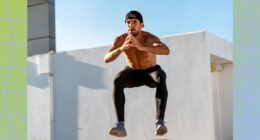Strength training is the name of the game if you want to slow down aging after 40, and for good reason. Leading your best, healthiest, most active life just got a whole lot easier, thanks to Heesun Kim, a personal trainer on Fyt, who shares with us the #1 strengthening workout to slow down the aging process in your 40s and beyond. (For those of you who didn’t know, Fyt is the biggest personal training service in the nation that makes expert-guided by a certified fitness professional—whether in-person or virtual—convenient for everyone.)
According to Kim, once you hit 30, sarcopenia can occur, causing a decline in your lean muscle mass. In fact, your muscle mass percentage can drop anywhere from 3% to 5% every decade after your 30th birthday, Harvard Health Publishing reports. “Maintaining and increasing lean muscle mass is essential to both aesthetics and health and overall well-being,” Kim explains, adding, “Muscle atrophy contributes to poor movement, injuries, and an increased body fat percentage. Individuals 60 and older are also at greater risk of osteoporosis and falling.”
So, with the help of Kim, we’ve rounded up the most productive strength workout to slow down aging after 40. Get ready for squats, step-ups, single-arm dumbbell rows, and dumbbell chest presses. Read on to learn how to do each of these movements properly.
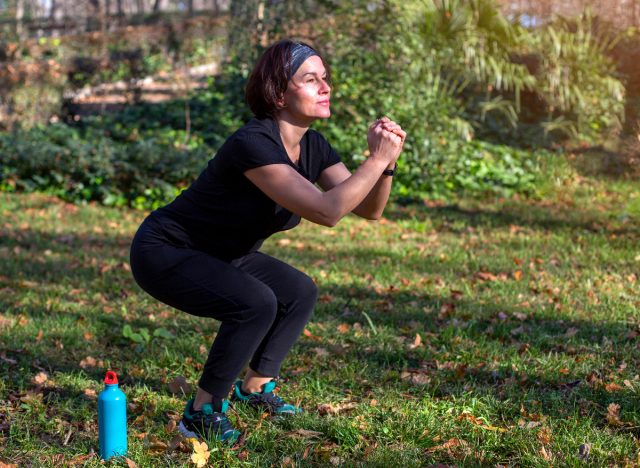

You’ll kick things off with Squats, which Kim reveals is one of the absolute best strength exercises to work the whole body. In addition to strengthening your quads, glutes, and hamstrings, performing this movement will activate your core muscles and boost stability that’s necessary for performing daily tasks.
To properly perform Squats, Kim instructs you to position your feet shoulder-width distance apart. Keep your head, shoulders, hips, and feet in one straight line, and activate your core. Then, squat down into an “invisible chair.” As you exhale, rise back up to the position you started in. You can perform a modification of this exercise—aka a Sit-to-Stand—by doing the same motion but sitting down on a chair and then standing back up. Perform 3 sets of 8 to 10 reps.
Related: Regain Muscle Mass After 50 With These Bodyweight Exercises, Trainer Says
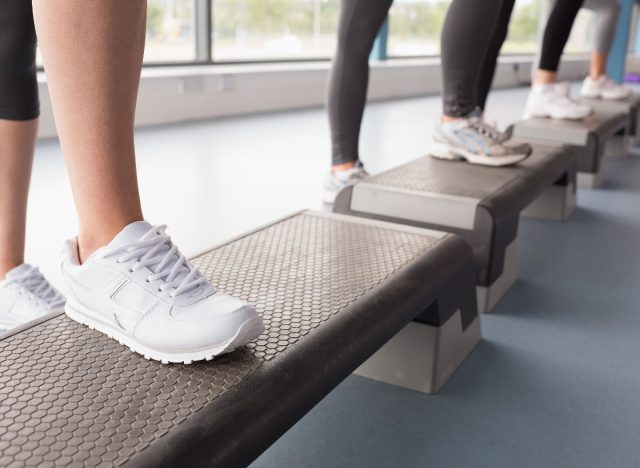

Next up, we have Step-Ups. This is another strength exercise Kim recommends for every age and level of fitness. It will activate your hamstrings, glutes, and quads.
READ RELATED: 70% of trusts MISS crucial 2-week cancer target
To get started, you’ll need to have a sturdy, elevated surface on deck that you can step up and down from, like a plyometric box. Stand one foot away from the box with your feet together. Then, put your right foot into the box while keeping your hips, knees, and ankles in line with one another. As you exhale, press your body weight into your right foot and stand on the box. Come down from the box by bringing your right foot to the floor behind you and assuming the starting position. Perform 10 reps before switching over to the left side, completing 2 to 3 sets for each side in total. Feel free to bump up the intensity of this exercise by incorporating dumbbells or utilizing a taller box.
Related: 5 Exercise Habits to Slow Muscle Aging, Trainer Reveals
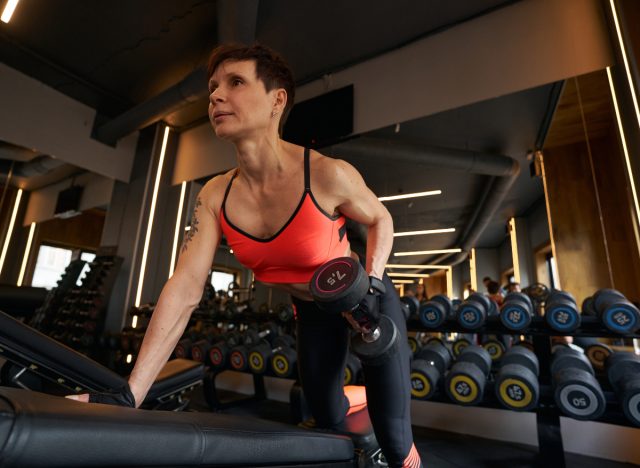

Kim tells us, “A healthy posterior chain and strong legs and core will help prevent injuries and help slow down aging after 40.” Single-Arm Dumbbell Rows will boost the strength of the larger muscle groups located in your torso, such as the latissimus dorsi, along with the upper and lower muscles in your back, and your smaller arm muscles, such as the biceps. By using correct form, you will activate your core and stabilize your muscles. Be sure to get comfortable enough with this exercise without weights before adding them in.
To begin, get the left side of your body prepped by putting your left knee, left foot, and left hand on a workout bench. Your hand should be below your shoulder, and your knee should be below your hip. Your right hand should be holding a dumbbell, off of the bench and directly below your right shoulder. Bring your shoulder blades together, be mindful of your lat muscles, and breathe out as you bring the weight toward your body. Using control, straighten out your arm to return to the position you started in. Do the same motion on your left arm. Perform 3 sets of 12 to 15 reps.
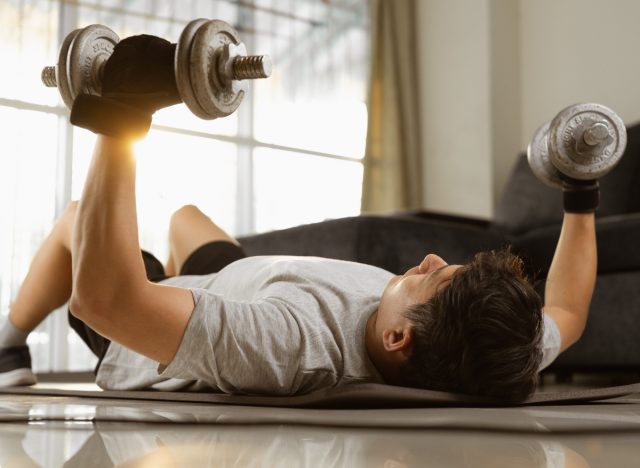

According to Kim, this final movement complements Dumbbell Rows by targeting the anterior muscles in your upper body. Get ready to work your pecs, deltoids, and triceps.
Start off by performing this exercise without weights. Once you’re totally comfortable with the motion, add in the dumbbells. To get started, have a dumbbell in each hand, and lie down on a workout bench with your hips, mid-back, and head touching the bench. Raise the dumbbells up to the sky over your chest, making sure your palms are facing toward your knees. Bring your shoulder blades together, and activate your core. Then, bend at your elbows and bring the dumbbells down to your chest by forming a 90-degree angle with both arms. Keep your elbows tucked just a bit lower than shoulder height. Breathe out as you press the dumbbells back up above your chest. Complete 2 to 3 sets of 10 to 12 reps.
Alexa Mellardo
Source:






